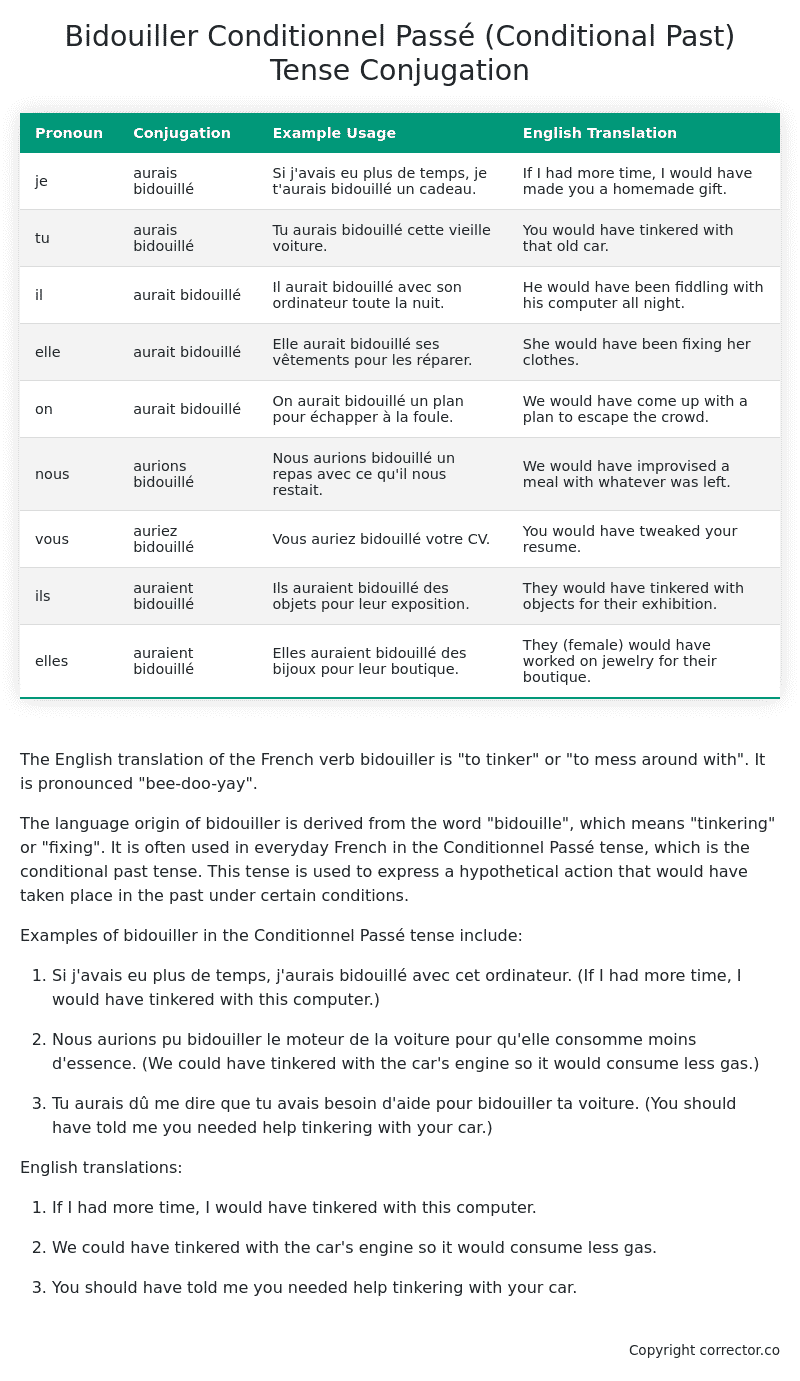Conditionnel Passé (Conditional Past) Tense Conjugation of the French Verb bidouiller
Introduction to the verb bidouiller
The English translation of the French verb bidouiller is “to tinker” or “to mess around with”. It is pronounced “bee-doo-yay”.
The language origin of bidouiller is derived from the word “bidouille”, which means “tinkering” or “fixing”. It is often used in everyday French in the Conditionnel Passé tense, which is the conditional past tense. This tense is used to express a hypothetical action that would have taken place in the past under certain conditions.
Examples of bidouiller in the Conditionnel Passé tense include:
-
Si j’avais eu plus de temps, j’aurais bidouillé avec cet ordinateur. (If I had more time, I would have tinkered with this computer.)
-
Nous aurions pu bidouiller le moteur de la voiture pour qu’elle consomme moins d’essence. (We could have tinkered with the car’s engine so it would consume less gas.)
-
Tu aurais dû me dire que tu avais besoin d’aide pour bidouiller ta voiture. (You should have told me you needed help tinkering with your car.)
English translations:
-
If I had more time, I would have tinkered with this computer.
-
We could have tinkered with the car’s engine so it would consume less gas.
-
You should have told me you needed help tinkering with your car.
Table of the Conditionnel Passé (Conditional Past) Tense Conjugation of bidouiller
| Pronoun | Conjugation | Example Usage | English Translation |
|---|---|---|---|
| je | aurais bidouillé | Si j’avais eu plus de temps, je t’aurais bidouillé un cadeau. | If I had more time, I would have made you a homemade gift. |
| tu | aurais bidouillé | Tu aurais bidouillé cette vieille voiture. | You would have tinkered with that old car. |
| il | aurait bidouillé | Il aurait bidouillé avec son ordinateur toute la nuit. | He would have been fiddling with his computer all night. |
| elle | aurait bidouillé | Elle aurait bidouillé ses vêtements pour les réparer. | She would have been fixing her clothes. |
| on | aurait bidouillé | On aurait bidouillé un plan pour échapper à la foule. | We would have come up with a plan to escape the crowd. |
| nous | aurions bidouillé | Nous aurions bidouillé un repas avec ce qu’il nous restait. | We would have improvised a meal with whatever was left. |
| vous | auriez bidouillé | Vous auriez bidouillé votre CV. | You would have tweaked your resume. |
| ils | auraient bidouillé | Ils auraient bidouillé des objets pour leur exposition. | They would have tinkered with objects for their exhibition. |
| elles | auraient bidouillé | Elles auraient bidouillé des bijoux pour leur boutique. | They (female) would have worked on jewelry for their boutique. |
Other Conjugations for Bidouiller.
Le Present (Present Tense) Conjugation of the French Verb bidouiller
Imparfait (Imperfect) Tense Conjugation of the French Verb bidouiller
Passé Simple (Simple Past) Tense Conjugation of the French Verb bidouiller
Passé Composé (Present Perfect) Tense Conjugation of the French Verb bidouiller
Futur Simple (Simple Future) Tense Conjugation of the French Verb bidouiller
Futur Proche (Near Future) Tense Conjugation of the French Verb bidouiller
Plus-que-parfait (Pluperfect) Tense Conjugation of the French Verb bidouiller
Passé Antérieur (Past Anterior) Tense Conjugation of the French Verb bidouiller
Futur Antérieur (Future Anterior) Tense Conjugation of the French Verb bidouiller
Subjonctif Présent (Subjunctive Present) Tense Conjugation of the French Verb bidouiller
Subjonctif Passé (Subjunctive Past) Tense Conjugation of the French Verb bidouiller
Subjonctif Imparfait (Subjunctive Imperfect) Tense Conjugation of the French Verb bidouiller
Subjonctif Plus-que-parfait (Subjunctive Pluperfect) Tense Conjugation of the French Verb bidouiller
Conditionnel Présent (Conditional Present) Tense Conjugation of the French Verb bidouiller
Conditionnel Passé (Conditional Past) Tense Conjugation of the French Verb bidouiller (this article)
L’impératif Présent (Imperative Present) Tense Conjugation of the French Verb bidouiller
L’infinitif Présent (Infinitive Present) Tense Conjugation of the French Verb bidouiller
Struggling with French verbs or the language in general? Why not use our free French Grammar Checker – no registration required!
Get a FREE Download Study Sheet of this Conjugation 🔥
Simply right click the image below, click “save image” and get your free reference for the bidouiller Conditionnel Passé tense conjugation!

Bidouiller – About the French Conditionnel Passé (Conditional Past) Tense
Formation
Common Everyday Usage Patterns
Expressing Unreal Past Scenarios
Polite Requests or Suggestions
Expressing Doubt or Uncertainty
Interactions with Other Tenses
Conditional Present
Indicative Past Tenses
Conditional Future
Summary
Want More?
I hope you enjoyed this article on the verb bidouiller. Still in a learning mood? Check out another TOTALLY random French verb conjugation!


